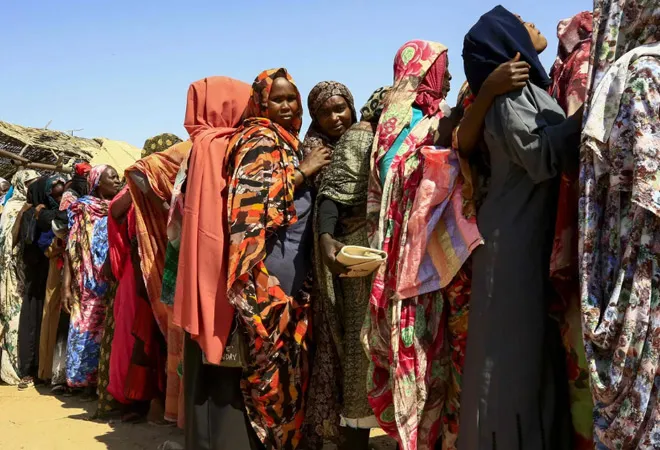-
CENTRES
Progammes & Centres
Location
Gender-based violence and curtailment of their rights have fuelled Sudanese women’s desire for resistance and change

As in any other crisis, the recent escalation of clashes between the Sudanese National Army and the Rapid Support (Forces)—two main factions of the military regime—which rocked the capital city of Khartoum on 15 April 2o23 has had a dire and devastating impact on the population, particularly on the lives of the Sudanese women and girls.
Stuck in the middle of a power struggle, they continue to grapple on multiple fronts and are finding it increasingly difficult to access even the most basic amenities such as sufficient food, clean water, healthcare, and services as well as protection from violence or abuse.
For instance, ever since the fighting began, at least 28 hospitals, including several maternity hospitals across Sudan, have been attacked, with more than 61 percent of health centres in Khartoum being forced to shut down. This has left thousands of Sudanese women—including 219,000 pregnant women and 24,000 of those who will deliver within the next three months without access to proper maternal health services and medical care.
Multiple accounts of rape and sexual, violence perpetrated by the RSF soldiers as well as by army officials have surfaced across Sudan.
Besides, multiple accounts of rape and sexual, violence perpetrated by the RSF soldiers as well as by army officials have surfaced across Sudan. They are neither safe on the streets nor within their own homes as many families have been forced to leave their houses by military soldiers. Many others have been forced to share their homes and belongings with RSF members, leaving women and girls at an increased risk of abuse.
This situation has been made worse as thousands flee their homes—within Sudan and to neighbouring countries like Egypt, Ethiopia, Chad, and the Central African Republic— exposing women to trafficking, exploitation, violence, etc. And lest we forget, all this is happening at a time when access to protection services and support has already been severely compromised and will likely become even more difficult if the fighting continues.
But despite these challenges, the women in Sudan have remained committed to making their voices heard in peacebuilding efforts. Women activists and human rights defenders in Sudan have taken to social media to call out and warn others about reported rapes being perpetrated by soldiers and provide a critical support network for survivors and those at risk of sexual violence. And as communication remains patchy, some graphic details have been shared online to paint the disturbing picture of the indiscriminate attacks on women.
Apart from this, women human rights defenders (WHRDs) are also calling for justice, accountability, and peace, and repeatedly calling for the end of the war. As a result, they have been working in an increasingly hostile environment and have been receiving threats that are putting their lives in danger.
Women activists and human rights defenders in Sudan have taken to social media to call out and warn others about reported rapes being perpetrated by soldiers and provide a critical support network for survivors and those at risk of sexual violence.
According to reports, three female healthcare professionals—out of which two are prominent activists—received alarming threats against themselves as well as their families, following a defamation campaign against the defenders calling for the cessation of conflict. Besides, women journalists, political activists, and lawyers have particularly been at risk following the escape of former regime leaders from prison.
It is, however, important to note here that this is not the first time that women in Sudan are leading the way to put an end to the power struggle and fighting for their rights. For years, they have advocated against the armed forces and the RSF and argued that these paramilitary units have not been committed to serving their welfare or interests. They have further raised their voices against militarisation and the ever-expanding military budget, which seemingly prioritises weaponisation over saving the lives of innocent women.
Sudanese women’s revolutionary fervour has a long history beginning as early as the late 19th century when women began organising and forming groups to resist colonisation as well as fight for their rights. And the establishment of the Sudanese Women’s Union (SWU) in 1952 marked a turning point in this women’s movement trajectory.
These developments were, nonetheless, hindered by the unstable political atmosphere in Sudan where political parties began monopolising women’s issues and excluded female representatives from leadership roles, thereby, preventing the overall development as well as progression of a strong women’s movement within the country.
Sudanese women’s revolutionary fervour has a long history beginning as early as the late 19th century when women began organising and forming groups to resist colonisation as well as fight for their rights.
But despite these persisting difficulties and an extremely patriarchal environment, women in Sudan played a critical role in the 2019 Revolution, which aimed to overthrow the dictator—Omar al-Bashir. Women were at the forefront of these revolutionary protests and their participation was instrumental in making the revolution a success.
Gender-based violence and curtailment of their rights have fuelled Sudanese women’s desire for resistance and change. And today, they are no longer alone. Sudanese migrants and refugees all over the world have joined them in solidarity, calling for an end to the violent clashes.
It is perhaps time that the voices of Sudanese women are heard, with their perspectives and experiences integrated into peacebuilding efforts to build sustainable peace and create a better socio-economic environment for all innocent Sudanese citizens.
Akanksha Khullar is a Visiting Fellow with Strategic Studies Programme at the Observer Research Foundation
The views expressed above belong to the author(s). ORF research and analyses now available on Telegram! Click here to access our curated content — blogs, longforms and interviews.

Akanksha Khullar is a Visiting Fellow with the ORFs Strategic Studies Programme where her work focuses on the intersection of policy advice and academic research ...
Read More +